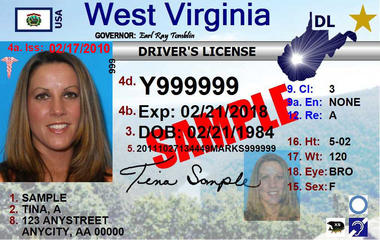W.Va. woman denied driver's license in wife's name

VICKI SMITH, Associated Press
MORGANTOWN, W.Va. (AP) — For the year since she married her partner, waitress Cynthia Landis has legally been a Landis. It's the name on her Social Security card, her District of Columbia marriage certificate and her Virginia driver's license.
But the state of West Virginia won't recognize it. The Division of Motor Vehicles won't issue the Romney resident a driver's license in that name because she's married to a woman, and state law forbids the agency from recognizing any documents related to a same-sex marriage.
The DMV would be glad to issue the 34-year-old Landis a license in her ex-husband's last name of Hatton, Deputy Commissioner Steve Dale said. In the state's eyes, that's still legally her name.
Otherwise, her only option is to get a circuit court judge to order a name change. Dale said that would be a legal document.
"I can't believe that the state has the right to just say, willy-nilly, 'We're only going to recognize the legality of the documents we choose and not these.' It's ridiculous," said Landis, who has sent a complaint letter to the governor's office.
"I'm not asking the state to recognize my marriage," she said, "but that is the proof that I have that my name has changed."
Landis married 30-year-old Augusta native Melissa Landis on Oct. 8, 2011, and went to the Social Security office in Hampton, Va., within a month to get a new card. The agency accepted her marriage certificate and issued a new card. Then she got a new driver's license.
The couple lived in Winchester, Va., until late September, when they moved to rural Hampshire County in West Virginia's Eastern Panhandle to be near Melissa's family. After 30 days, state law requires new residents to surrender their old licenses and obtain West Virginia cards.
Technically, Cynthia Landis said, she's now an illegal driver, even though her Virginia license is valid through 2020.
"I expected whispers and rumors. We're from a small town in a little county. You expect people to say stuff or give you dirty looks in the grocery store," she said. "You don't expect a government entity to basically tell you that you don't exist."
The DMV understands her frustration, Dale said, "but it is up to each state to establish their own standards."
In 2000, at the request of then-Republican Gov. Cecil Underwood, West Virginia lawmakers passed their own version of a Defense of Marriage Act, specifying that the only legal union is one between a man and a woman.
That law says any "public act, record or judicial proceeding of any other state" regarding a same-sex marriage, "or a right or claim arising from such relationship, shall not be given effect by this state."
"If this law were not in effect," Dale said, "we would have taken the marriage certificate on its face value as an official record and used it."
Since January, people whose names have changed since birth have faced new hurdles in proving their identities. They must produce multiple forms of ID and proof of name changes to obtain, transfer or renew a driver's license.
The state recognizes passports, heterosexual marriage certificates, divorce decrees that order a name change and court orders, Dale said. Proof of residency is also required.
The process is often a hassle for women, who are more likely to change their names after a marriage, but Dale said many people change their names for other reasons, often because they just don't like the one their parents chose.
A Social Security card isn't good enough in Landis' case because it's not evidence of a legal name, Dale said. Her Virginia license merely shows she was a valid driver, so West Virginia could waive the written and road skills tests.
"Her only solution," he said, "is to go to court and have a judge order a name change."
But Landis said she can't afford a lawyer, and she shouldn't have to "pay whatever I have to pay to change my name to what it already is."
Nor will she seek a license in her ex-husband's name. Instead, she'll try to draw attention to what she sees as discrimination.
She noted that her marriage certificate doesn't specify the gender of either spouse.
"It doesn't even specify bride or groom," she said. "If one of us had an androgynous name like Jesse or Pat, we'd probably fly right through the system."
Earlier this year, retiring Delegate John Doyle, D-Jefferson, introduced a bill to give gay and lesbian couples the same legal protections as heterosexual married couples. They should have the same safety net to deal with the death of a parent or the loss of a job as married couples, he argued.
Fairness WV, which advocates on behalf of the gay, lesbian and transgender community, said it was the first time a civil union bill was introduced in the West Virginia Legislature.
It went nowhere.





